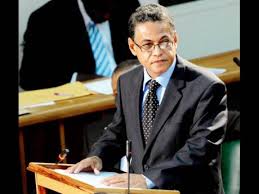
BUILDING BILL TABLED IN THE HOUSE OF REPRESENTATIVES
Minister of Local Government and Community Development, Noel Arscott, this week (January 19) tabled the Building Bill, 2016, for Parliamentary debate and passage.
The Bill will among other objectives create
a: New legal and regulatory framework,
b: Reduce the vulnerability of the built environment and ensure public safety,
c: Minimize damage caused by natural or man-made hazards, prevent squatter
settlements and promote sustainable development.
The Building Bill will also regulate building activities by requiring permits, regulate change of building use, give effect to the National Building Code, facilitate the adoption and application of internationally recognized building standards, as well as the accreditation of building products, construction methods, building components and building systems.
These emphases on modernity and effectiveness also include the construction of buildings that are environmentally friendly and energy-efficient, and, also, accommodate the public good through features such as sanitary facilities and access points for persons with physical challenges.
Just as importantly, the legislation will create the framework for an efficient system for issuing building permits and certificates of occupancy, establish a fair system for the resolution of building disputes, regulate training and certification standards, license building practitioners and establish procedures for recognizing building professionals.
The Kingston and St. Andrew Corporation, all Parish Councils and Municipalities, Portmore being the only one now in existence, will constitute Local Building Authorities for their respective jurisdictions, responsible for the general administration of the law.
They will consider applications for building permission, ensure that all building work within their areas of jurisdiction is carried out in accordance with the Bill and the National Building Code; issue certificates of compliance and certificates of occupancy for buildings and building work, and prescribe fees for services provided by them or on their behalf.
The Local Authorities are also empowered to seek external expertise where needed, to ensure the technical integrity of their regulatory functions. Accordingly, to Minister Arscott, this should not be seen as creating bureaucratic obstacles to timely approvals for building works and other activities for which permission is required. “I know about the concern that some compliance processes are unwieldy, and can essentially be an obstacle to the timely completion of projects. I can assure you that while compliance will still be emphasized, speed and efficiency are strongly encouraged by this Bill. It provides, for example, that aLocal Building Authority shall not refuse to approve building work, on the ground that any building product, construction method, building component or building system connected to the building work is unsatisfactory, if that product, method, component or system is accredited by a Standards Authority and complies with that accreditation. In this case, the Standards Authority will be the Bureau of Standards, which will also have a primary role in administering the National Building Code”.
The rights of individual property-owners and communities are also contemplated in the Bill, which will empower the Local Building Authority to convene public or private consultations, where building work is proposed or where there is objection to the works proposed. The Authority will then consider whether the proposed building work is likely to have an adverse impact on any person; and whether the proposed use of the building and the nature of the construction will require interested persons and other members of the public to be notified.
The National Building Bill contains updated penalties for a range of breaches, from the commencement of works without permission, to the prevention of authorized representatives of the Local Building Authority from inspecting projects. It also features a comprehensive mechanism of counterbalances to guard against arbitrariness, to encourage the members of the industry to participate fully in the new regime of compliance, and to ensure the timely application of contemporary standards.
The first of these is a Building Appeal Tribunal, which is authorized to hear any complaint submitted to it in relation to any decision of the Building Authority.
There will also be a Building Practitioners Board, which will among other things, define and establish categories of building practitioners and determine the scope and nature of building works that each category shall be licensed to perform. The Board will also determine qualifications, requirements and other criteria for the licensing of building practitioners, issue licenses to them, establish guidelines regarding licensing systems, and review and monitor their professional conduct. The Board will have the power to appoint examiners to test persons applying for licenses as building practitioners; and prescribe the procedure to be followed in respect of disciplinary proceedings against building practitioners.
A Building Advisory Council will also be established, which will advise the Minister about matters of general policy relating to the building industry and the administration of the Building Bill and Regulations.
The Building Bill 2016 is now available for public viewing on our website.






